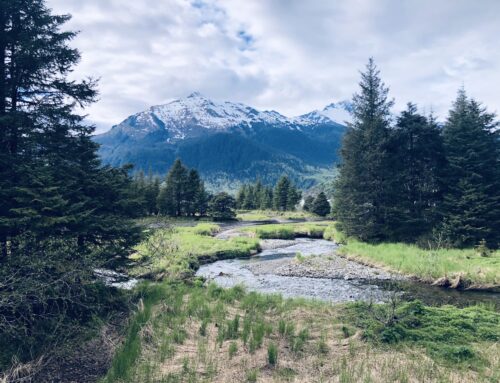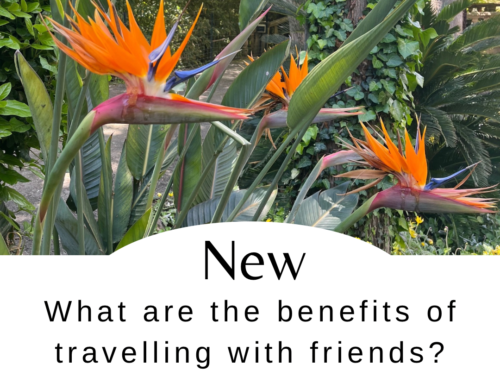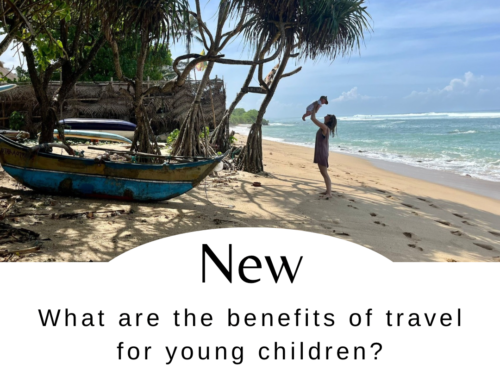Dr Julie Hannan, Chartered Psychologist & Guest Contributor
I’m writing this on a slow train winding its way from Perpignan to Toulouse. I’m travelling solo for a couple of weeks, taking a break from my routines, responsibilities, and roles. As I watch sunflower fields and sleepy villages glide past, wishing the carriage had better air conditioning (it’s 35 degrees here), I can’t help but reflect: in midlife, travel can often stir something more profound than a craving for adventure and become a gateway to identity, reinvention, and rediscovery. I’ve travelled a lot already this year, a month around Portugal and Spain on the back of a motorbike with my partner. Now I have two weeks in France on my own for time to reflect, think, about the new business I have been contemplating, walking and gyming to offset the odd croissant or deux.
The benefits of travelling in our 40s and 50s
As a psychologist, I support many people in their 40s and 50s as they navigate what I call the ‘the midlife passage‘. You may have ticked all the life boxes—career, relationship, home. Or maybe not. Either way, something starts to shift. Questions surface: “Who am I now?”, “Is this it?”, “What’s next for me?” When travel enters the picture, especially for singles, divorcees, empty nesters or couples without children, those questions can begin to dial up a little louder. Travel can become the catalyst for an inner transformation.
I’ve always been a bit of a home bird, though always enjoyed a break away alone, no responsibilities and my time is my own and I’m always curious about how I’ll spend it – it’s never really rushing from tourist site to the next, but more waking, observing, integrating into a new social situation. So, what do I believe travel offers? The answer, an intentional disruption that activates my brain, it isn’t just a vacation. I can feel a need for this rise when I haven’t shifted location for a while, and I’m getting better at recognising my need for a change of scene. My brain begins to feel a bit scrambled, as if it’s in a sandstorm; I can’t get clarity, I’m bored, and I need something new. Studies conducted since 2020 have shown that stepping into new environments enhances cognitive flexibility, boosts creativity, and challenges habitual thinking patterns (Müller & Schlegel, 2021). A recent analysis even found that frequent travel boosts “cognitive reserve,” which may help buffer against age-related decline (Age UK, 2022).
For many of us in our 40s and 50s, travel isn’t about escaping—it’s about reconnecting with ourselves. It offers a chance to meet the person you are now—and maybe the person you’re becoming. So, as a travelling midlife psychologist, here are my main reasons and benefits for travelling, perhaps some will resonate with you:
Cognitive renewal
Learning new navigation systems, languages, or cultural cues stimulates neuroplasticity. These experiences promote mental agility and help protect against cognitive ageing (Age UK, 2022). Yes, I have been breaking out my ‘A’ level French this past week, growing in confidence and speaking a little louder – what’s the worst that can happen…right!?
Mental health boost
According to a 2021 U.S. Travel Association study, 84% of people reported experiencing positive mental health effects from vacations—less stress and anxiety, and greater emotional recovery (U.S. Travel Association, 2021). Annual vacations have also been linked to a reduced risk of heart disease and improved sleep patterns (Sonnentag, 2018). Yes, please!
Identity expansion
Midlife travel removes us from familiar roles and allows re-exploration. It’s an identity lab where your sense of self can expand beyond traditional roles as parent, partner, or professional. Who knew I would become a reincarnation of Elizabeth Gilbert, eating, praying (well, maybe not so much) and loving my way around the world?
Relationship renewal
Shared travel fosters communication, intimacy, and connection. Couples returning from trips often report an improvement in relationship quality, particularly when engaging in novel experiences together (Chen & Petrick, 2013). Being away from your partner can also be refreshing and remind you of all the reasons why you are with them. A little bit of missing them definitely doesn’t do a relationship any harm in my experience.
Sense of Agency
I travelled extensively for work in my 20s, including to the US and Europe, as I lived in Jersey for five years but worked for our office in the British Virgin Islands. Then, becoming a parent and single mum meant that my jetting off was paused for a while. Still, now that the kids have left home, I’m remarried, and I find that organising a trip, navigating new cities, and managing logistics all reinforce autonomy, competence, and my sense of self, ultimately reducing a sense of invisibility that many people can experience at this life stage.
The challenges of travelling in our 40s and 50s
But what do you need to watch out for, what challenges might you face when travelling, and how can you balance them within your new adventure?
Health and mobility
Well, none of us is getting any younger, so health and mobility are essential to take care of. Fatigue, chronic pain, or mobility issues can make long-distance travel physically demanding, especially when planning back-to-back activities. Therefore, it’s crucial to eat well, sleep well, and nourish yourself well. I always find a gym at each place I go and keep up my 3 times a week weight training sessions.
Anxiety and safety
Solo travellers—especially women—may experience stress related to safety concerns. One study noted Brazilian women travellers prioritise safety and comfort in destinations (Korstanje, 2018). Another study found that 11.3% of travellers report travel-related anxiety (Mikulić et al., 2020). I often stay in Airbnb’s, but on the top floor of a building or in an apartment or annexe attached to the owner’s house, to try and offset any safety concerns
Financial constraints
While travel boosts wellness, it requires resources. Without sufficient financial breathing room, the benefits may be overshadowed by stress. I keep my work restricted to the same 3 days a week. Sacrificing three days of freedom, knowing I am continuing to make money, sits well with me. And to reduce stress, I always, always, send a message to the apartment owner asking them to confirm the Wi-Fi is fast enough for Zoom calls.
Travel as a growth opportunity
Interestingly, many challenges also double as growth catalysts. Enduring discomfort builds resilience. Navigating solo travel enhances self-compassion and independence. Challenges become metamorphosis moments—and midlife is all about transformation.
Digital nomad life in midlife
Working remotely—from cafes in Toulouse, beaches in Bali, or trains across France—is increasingly common. However, midlife digital nomads travel with purpose rather than merely escaping. They seek balance, depth, and enrichment, aligning life with deeper values. Despite the freedom, vulnerabilities remain. That’s why anchors—such as community, self-care practices, and purposeful planning—matter immensely.
Overall, for me, travel isn’t a luxury, but a form of self-growth. Essentially, if you’re in your 30s, 40s or 50s and feeling restless or curious, consider travel as more than just a break. Treat it as self-inquiry. Whether it’s two weeks exploring France or six months across Asia, travel offers fresh perspectives on who you are and who you’re becoming.
In developmental psychology, Erik Erikson described midlife as a pivotal turning point between generativity—the desire to contribute, grow, and feel purposeful—and stagnation, characterised by emotional flatness, disconnection, or inertia. Travel, when done with intention, can be a powerful intervention in this cycle. It interrupts familiar routines and invites us to engage with the world, to generate new experiences and fresh perspectives. For many midlifers, particularly those who feel “stuck”, lost, or on autopilot, travel serves as a regenerative force. It offers not just escape, but re-engagement—with curiosity, connection, and the sense of being part of something bigger. Midlife doesn’t have to become a crisis; it can be more of a crossroads. And sometimes, all it takes is a suitcase and a bit of courage to set yourself on a new course.
If you’d like to read more about identity, transitions, and reinvention in midlife, then please take a look at my book The Midlife Crisis Handbook and my new venture, started during my trip to Perpignan – The Midlife Academy (https://www.midlife.co.uk)—where we offer evidence-based courses and expert guidance for this powerful life phase. You can also explore more of my writing or connect via www.drjuliehannan.com

References
Age UK (2022). ‘What is Cognitive Reserve?’. Retrieved from https://www.ageuk.org.uk/information-advice/health-wellbeing/mind-body/what-is-cognitive-reserve/
U.S. Travel Association (2021). ‘The Mental Health Benefits of Travel’. Retrieved from https://www.ustravel.org/research/mental-health-benefits-travel
Müller, V. & Schlegel, K. (2021). ‘A ticket to creativity: Travel abroad and cognitive flexibility’. Journal of Personality and Social Psychology. https://doi.org/10.1037/pspa0000246
Sonnentag, S. (2018). ‘The Recovery Experience Questionnaire: Development and validation of a measure for assessing recuperation and unwinding from work’. Journal of Occupational Health Psychology. https://doi.org/10.1037/a0022195
Chen, C.Y., & Petrick, J.F. (2013). ‘Health and Wellness Benefits of Travel Experiences: A Literature Review’. Journal of Travel Research. https://doi.org/10.1177/0047287513496477
Mikulić, J., et al. (2020). ‘Travel and anxiety: An exploratory study among midlife travellers’. International Journal of Tourism Research. https://doi.org/10.1002/jtr.2351
Korstanje, M. (2018). ‘Solo female travellers’ perception of safety: Evidence from Latin America’. Tourism and Society, 5(2), 56–70. https://www.researchgate.net/publication/327566660





